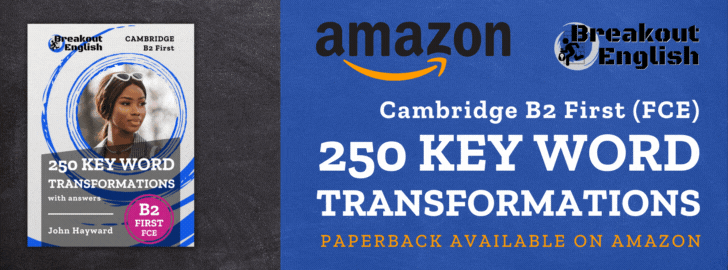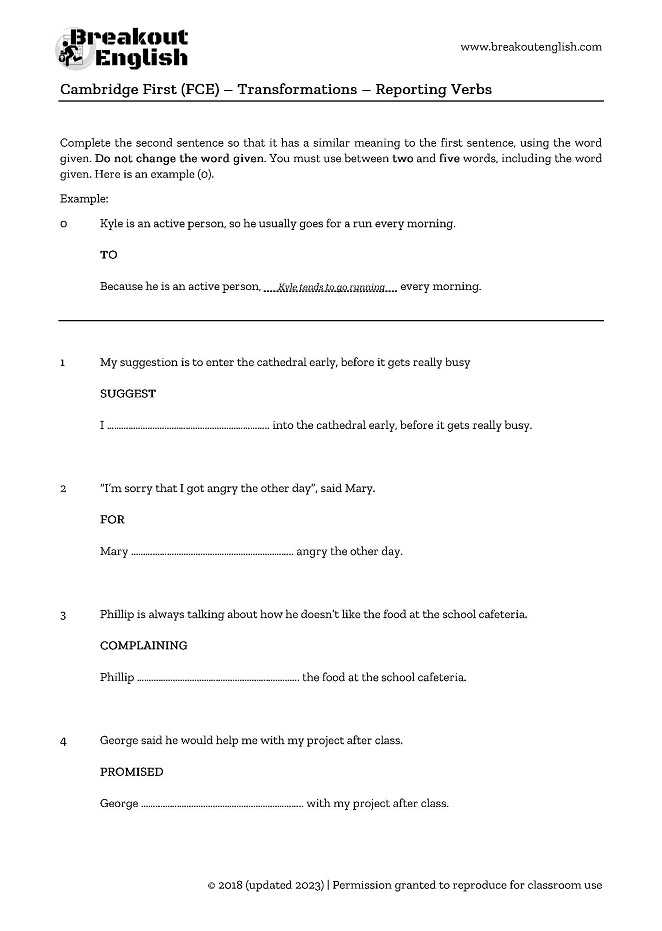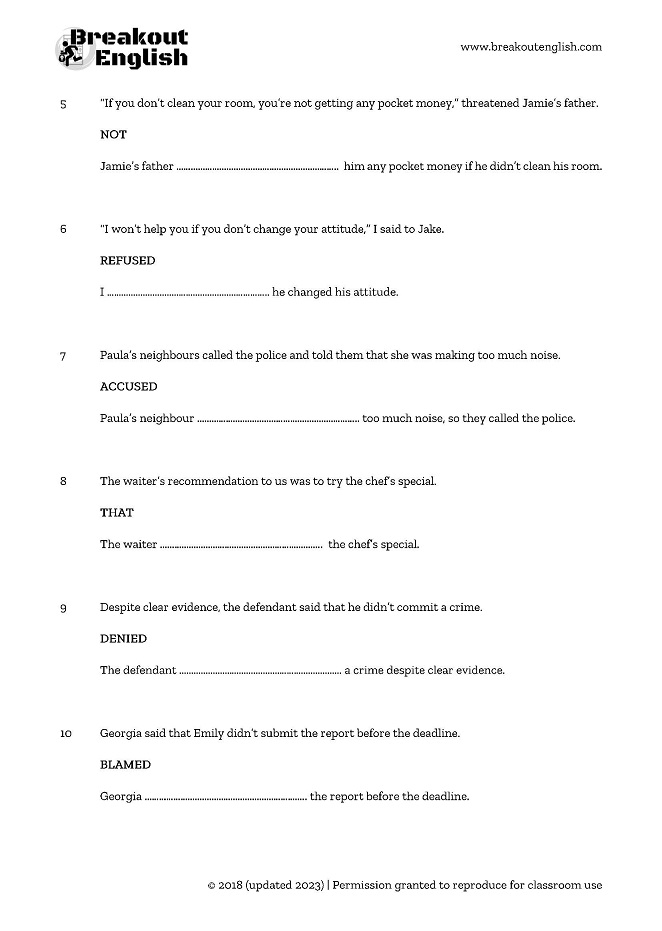Reporting verbs is a challenging grammar point at B2 level, but doing plenty of reporting verbs exercises can help. This grammar combines reported speech, which is nobody’s favourite, with verb patterns, which is really nobody’s favourite. Throw in using the reporting verbs in the past and you’ve got a messy lesson on your hands.
In the First Certificate exam, there often seems to be at least one key word transformations question with reporting verbs. So, like always, we need to prepare students for the eventuality of encountering it in the exam. Below, you’ll find 10 key word transformation questions for the Cambridge B2 First (FCE) Use of English Part 4. If you are looking for even more transformations to practise for the exam, consider picking up Breakout English’s book 250 Key Word Transformations for the B2 First exam.
GET 250 B2 FIRST (FCE) KEY WORD TRANSFORMATIONS:

Contents
Why do you need to know reporting verbs?
It is essential to familiarise your students with the unique structures that follow reporting verbs so that they can confidently and accurately use them in their exams. One effective way to do this is through drilling. This involves repeating the structures multiple times to help students internalise them. You can do this by repeating the phrases from your controlled practice activity in a course book or grammar book. Try drilling by building up the sentence from one word until it’s complete. Then break it back down. Drill fast, then slow, then quiet, then loud. It’s a fun activity and helps students with complex pronunciation and connected speech.
Another useful technique is to present your students with real-life examples of how the reporting verbs are used in context. This could involve reading articles or watching videos that contain examples of reporting verbs. Encourage your students to identify and highlight the reporting verbs in the text and discuss the structures that follow them. Youglish is an impressive tool to find words in context in YouTube videos. Just search for the phrase you want to see and it will find a series of videos using that word.
Incorporating role play activities can also be helpful. For example, students could take on the role of journalists reporting a news story, or characters in a scene discussing events that have taken place. After the role play, have students switch roles and share their findings. This forces them to used reported speech and reporting verbs. These reporting verbs activities not only provide students with the opportunity to practise using reporting verbs but also allow them to have fun while doing so.
Examples of reporting verbs
As you can see in the examples below, there are often multiple structures that can be used following different reporting verbs. They might be followed by a gerund, an infinitive, a preposition + gerund or a “that” clause. They might also require or not an object following the verb.
“We should go out on Saturday,” suggested Paul.
- Paul suggested going out on Saturday.
- Paul suggested (that) we go out on Saturday
“I didn’t see anything,” claimed Sarah.
- Sarah claimed not to have seen anything.
- Sarah claimed (that) she hadn’t seen anything.
“I’m going to quit my job,” announced Jane.
- Jane announced (that) she was going to quit her job.
- Jane announced quitting her job.
“I can’t make it to the meeting,” apologised Tom.
- Tom apologized for not being able to make it to the meeting.
- Tom apologized (that) he couldn’t make it to the meeting.
“I’ve never been to Paris,” admitted Lucy.
- Lucy admitted (that) she had never been to Paris.
- Lucy admitted never having been to Paris.
It’s important to note that some reporting verbs have a set structure that we must follow, while others can have more flexibility in terms of structure. It’s also important to be aware of the tense changes that might occur in the transformation from direct speech to reported speech.
Practice is key when it comes to mastering reporting verbs. Encourage your students to practise using different reporting verbs and structures in various contexts to help them feel confident and comfortable with this grammar point.
There are no hard and fast rules to tell your students which verbs have which patterns, so use your course book or a nice grammar explanation like this one from perfect-english-grammar.com.

The Materials
Once your students have a grasp of the grammar, they need practice! That’s where the reporting verbs exercises on this page come in. Get as much practice as possible using reporting verbs in an exam format.
Here are 10 transformations for your students to practise. This reporting verbs exercise will help you and your students visualise how reporting verbs are used in the Cambridge B2 First (FCE) exam. I often like to search some past papers to find a real exam with an example too, just to prove to doubtful students that they do and may well pop up.
EXAM PART: Use of English Part 4
EXAM SKILLS: Using grammar appropriate to the level (B2), key word transformations
TIME: 20 minutes + feedback
PREPARATION: One copy of the worksheet per student
Download




